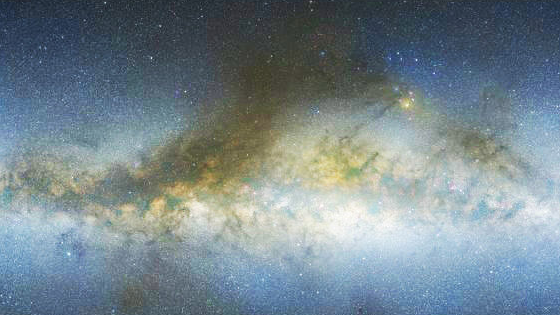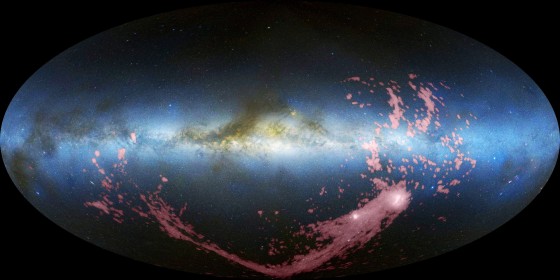The Milky Way Galaxy’s MAGELLANIC STREAM is a pretty ribbon.
The southern hemisphere of our galaxy is gassy. Much like my southern hemisphere. Unlike my own Tootin’ Corner (as I call it), the reasons for the Milky Way Galaxy’s ribbon of potentially star-forming gas are much, much more epic.
Hit the jump to behold the Magellanic Stream! Oh, and some more info.
Eons ago, two of our satellite galaxies became locked in a cosmic game of tug-of-war. Their fierce gravitational interactions ripped out a huge ribbon of hot, potentially star-forming gas that now surrounds much of our own galaxy’s southern hemisphere, as this amazing new Hubble image shows.
The so-called Magellanic Stream takes its name from its progenitors, the dwarf galaxies known as the Large and Small Magellanic Clouds. First sighted decades ago, the Magellanic Stream had long defied precised explanation, and it’s only this year that astronomers now feel confident that they understand just where this huge ribbon comes from. There’s also the question of where it’s going; it’s possible that the ribbon will eventually fall into our own galaxy, setting off a new frenzy of star formation. There’s a good rundown of the story over at Wired, and here’s some more context on the Hubble image from NASA:
This composite image shows the long ribbon of gas, discovered at radio wavelengths in the 1970s, in pinkish hues against an optical all-sky view across the plane of our Milky Way galaxy. Both Large and Small Magellanic Clouds, dwarf satellite galaxies of the the Milky Way, are seen near the head of the stream at the right. Data from Hubble’s Cosmic Origins Spectrograph were used to explore abundances of elements along sightlines to quasars that intersect the stream. The results indicate that most of the stream’s material comes from the Small Magellanic Cloud. The Magellanic Stream is likely the result of gravitational tidal interactions between the two dwarf galaxies some 2 billion years ago, the Small Magellanic Cloud losing more material in the encounter because of its lower mass.
[io9]





